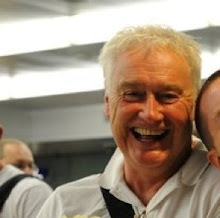Tom Courtenay and Michael Gambon already had impressive stage credentials, and it's not fair to set their reputations against Stephen Mangan and Ben Miles respectively. Mangan is an excellent TV actor, deservedly rated for Green Wing as much as his Barclaycard adverts, but he's miscast as the wild and woolly Norman, failing to emulate Courtenay's touching pathos and vulnerability, and whilst magnetic on the small screen, unkempt and undressed for the stage he seems to have lost his allure.

MANGAN

MINGIN'
Ben Miles does much better in the role of Tom the vet, but his tragic flaw is simply that he is not Michael Gambon.
Ayckbourn writes best for women and two of the three female characters became archetypes for possibly two of the most popular TV characterisations ever. 'The Good Life' writers John Esmonde and Bob Larbey chose Felicity Kendal and Penelope Keith after seeing them perform on stage together and the characters of Margo and Barbara represent a tangible debt to The Norman Conquests.
Amanda Root doesn't have the stature to be as commanding as Keith, and seems all the more peevish by comparison: her transcendence into passionate woman is far less believable without the physical hauteur to set up the situation. Jessica Hynes (Stephenson) is another solidly talented TV writer and actor, but can't achieve the girlish vulnerability of Kendal's Annie and has been dressed appallingly by a costume designer whom I would guess didn't live through it and has therefore treated the period as a joky freak show, instead of researching more accurately suburban fashion of the mid-70s.
Pitching the play in the round lends it a fresh initimacy, taking it back to the original Scarborough production of 1973 - although these are not necessarily characters with whom one would wish to be intimate since all of them have an unpleasant side - and this encouraged some of last night's audience to make audible contributions. Perhaps Ayckbourn should develop an interactive script.;
Saw Andrew Lloyd Webber in the audience, I hope he's not considering turning it into a musical.



